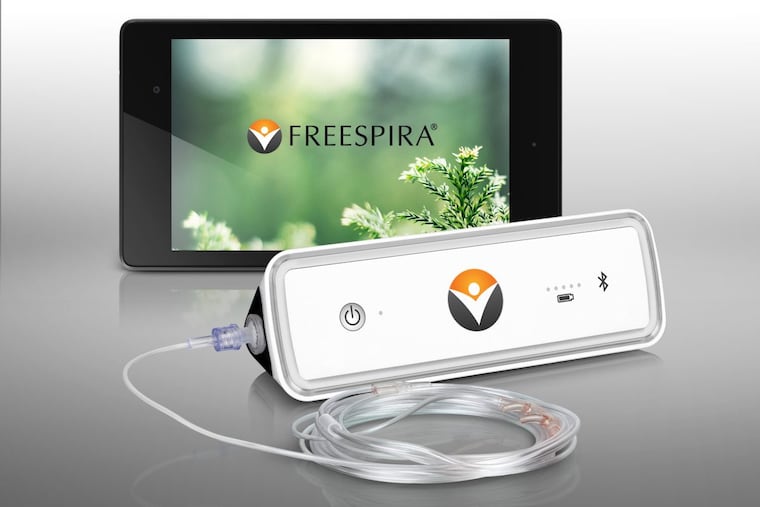Study finds breathing device treats panic attacks - and lowers medical costs
The theory behind the treatment is that improper breathing - too fast or too deep - can trigger physical symptoms that spiral into full-blown panic attacks.

A device that combats panic attacks by teaching patients to breathe differently performed well both clinically and financially in an unusual medical study funded by Highmark, the western Pennsylvania health insurer.
Eighty percent of the 50 Highmark subscribers who used Freespira for a month were panic-attack free 12 months later. Ninety-three percent had fewer panic symptoms.
A year after treatment, their total medical costs were down by half, emergency department costs fell by 64 percent and medication bills fell by 53 percent. On average, total annual costs for sickness-related medical visits were $2,880 less per person than they had been the previous year.
Treatment with Freespira, which also involves a few therapy sessions, costs $850 to $1,000, said Debra Reisenthel, CEO of Palo Alto Health Sciences, Inc., maker of the biofeedback device.
The theory behind the treatment is that improper breathing — too fast or too deep — can trigger physical symptoms that spiral into full-blown panic attacks.
Freespira was tested as part of Highmark's VITAL (Verification of Innovation through Testing, Analysis and Learning) Innovation Program. VITAL gathers extra information on new medical treatments that are approved but have not yet proven themselves worthy of insurance reimbursement.
Previous tests have led to coverage for Linx, a device that helps patients with GERD or reflux diseases, and a heart test that reduced unnecessary catheterizations. The program currently is looking at genetic testing to manage patients who take multiple drugs, and office-based knee arthroscopy, said Eileen Rodgers, VITAL's director.
For the Freespira trial, Highmark partnered with its medical affiliate, Allegheny Health Network. Allegheny's therapists enrolled patients in the trial and trained them to use the machine.
Anthony Mannarino, vice chair of the department of psychiatry at Allegheny General Hospital, led the trial for Allegheny Health Network. He said he was a skeptic at the onset of the testing, but was ultimately impressed by the "major league reductions in panic symptoms." Without treatment, he said, most people with panic disorder have symptoms at least a couple times a month. Many people have attacks several times a week.
Six million people in the United States have panic disorder, and 27 million have episodes of panic. The condition can quickly become expensive because its frightening physical symptoms — racing heart, chest pain, breathing problems — often lead to emergency department visits. Some people become so fearful of attacks that they rarely leave their homes. Then they can become depressed and need treatment for that, Mannarino said.
As a result of the trial, he said, Highmark plans to roll out coverage to its subscribers in the Allegheny system next year. If Freespira continues to perform well, subscribers who receive care elsewhere may also be included.
Patients with panic disorder can be treated with anti-anxiety drugs and antidepressants. Those work but there's a high relapse rate if people stop taking them, Mannarino said. Some studies show that cognitive behavior therapy, which involves learning to think about problems differently, has success rates similar to Freespira. The problem there is that few therapists are trained to offer it effectively, which can mean 12 to 15 sessions.
Freespira is based on the premise that most people with panic disorder hyperventilate. That leads to an imbalance of oxygen and carbon dioxide in the blood. The device uses biofeedback to teach users to breathe slowly, evenly and shallowly and to exhale thoroughly.
Freespira measures respiration rate and carbon dioxide through nasal tubes. Patients are instructed to practice for 17 minutes, twice a day. They can track their progress on a computer tablet. Sound cues tell them when to inhale and exhale. Over four weeks, their breathing rate declines to six breaths per minute.
Reisenthel said Freespira is not yet covered by any major health insurer, but Anthem, Inc. is conducting a test similar to Highmark's in Wisconsin. Some large companies that self-fund insurance plans for their employees are offering the device on a pilot basis.
She said the company is testing whether Freespira can help veterans with post-traumatic stress disorder and working with Johns Hopkins Medicine to test the device in adolescents with significant anxiety and panic.